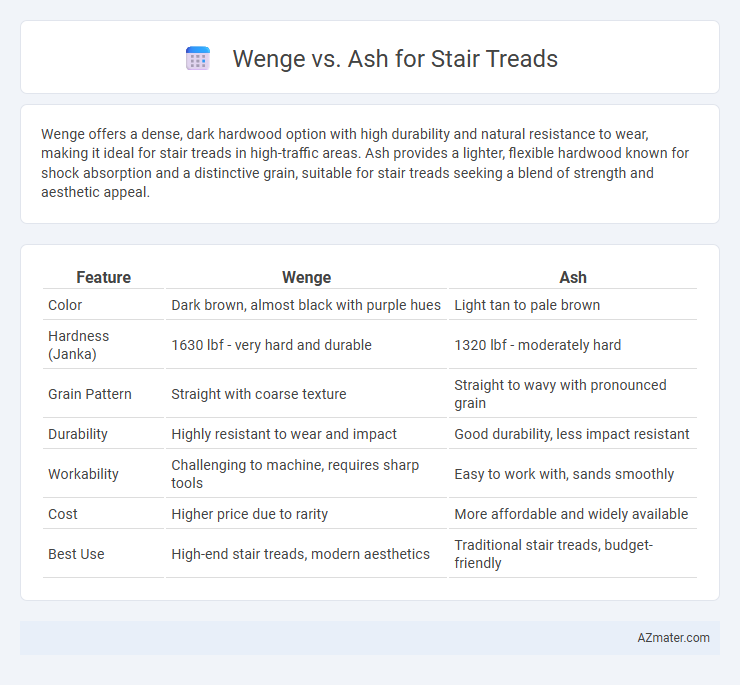Wenge offers a dense, dark hardwood option with high durability and natural resistance to wear, making it ideal for stair treads in high-traffic areas. Ash provides a lighter, flexible hardwood known for shock absorption and a distinctive grain, suitable for stair treads seeking a blend of strength and aesthetic appeal.
Table of Comparison
| Feature | Wenge | Ash |
|---|---|---|
| Color | Dark brown, almost black with purple hues | Light tan to pale brown |
| Hardness (Janka) | 1630 lbf - very hard and durable | 1320 lbf - moderately hard |
| Grain Pattern | Straight with coarse texture | Straight to wavy with pronounced grain |
| Durability | Highly resistant to wear and impact | Good durability, less impact resistant |
| Workability | Challenging to machine, requires sharp tools | Easy to work with, sands smoothly |
| Cost | Higher price due to rarity | More affordable and widely available |
| Best Use | High-end stair treads, modern aesthetics | Traditional stair treads, budget-friendly |
Introduction to Wenge and Ash Stair Treads
Wenge stair treads are prized for their deep, rich brown color with striking dark veining, offering a luxurious and distinctive appearance in wood flooring. Ash stair treads, known for their light color and prominent grain pattern, provide a durable and clean aesthetic ideal for modern and traditional interiors. Both woods feature excellent hardness and wear resistance, making them highly suitable for stair treads that demand strength and longevity.
Appearance and Color Differences
Wenge stair treads showcase a deep, rich brown to almost black hue with subtle, fine grain patterns that create a dramatic and luxurious visual impact. Ash stair treads present a lighter, creamy beige to pale brown color with prominent, straight grain patterns that offer a clean, modern, and natural aesthetic. The stark contrast between Wenge's dark, exotic look and Ash's bright, open appearance makes each wood suitable for distinct interior styles, emphasizing either bold elegance or light, airy designs.
Grain Pattern and Texture Comparison
Wenge stair treads feature a dark, dense grain pattern with fine, closely spaced lines that create a luxurious, smooth texture, ideal for high-end interiors requiring rich visual depth. Ash stair treads showcase a lighter tone with a more pronounced, open grain pattern, offering a coarse texture that emphasizes natural wood character and enhances grip. The contrasting grain patterns and textures of Wenge and Ash provide distinct aesthetic and tactile experiences for stair tread applications.
Durability and Hardness
Wenge wood exhibits exceptional durability and hardness, with a Janka hardness rating of approximately 1,930 lbf, making it highly resistant to wear and ideal for stair treads subjected to heavy foot traffic. Ash wood, while also durable, has a lower Janka hardness rating around 1,320 lbf, offering good impact resistance but less robustness compared to Wenge. Choosing Wenge for stair treads ensures superior longevity and scratch resistance, whereas Ash provides a slightly softer, more flexible option that is still reliable for everyday use.
Maintenance and Cleaning Requirements
Wenge stair treads require regular dusting and occasional wiping with a damp cloth to maintain their deep, rich color, avoiding excessive moisture to prevent warping or discoloration. Ash stair treads are more resilient to scratches and easier to clean with standard wood cleaners, benefiting from periodic oiling to preserve their light, natural finish. Both woods demand prompt spill cleanup and protection from harsh chemicals to ensure longevity and aesthetic appeal.
Cost and Availability
Wenge stair treads are typically more expensive than ash due to their exotic status and limited supply, with prices often ranging from $15 to $30 per board foot. Ash is more widely available in North America, making it a cost-effective option, usually priced between $5 and $12 per board foot. The greater availability of ash ensures shorter lead times and easier procurement for stair projects compared to the rarer, imported wenge wood.
Installation Considerations
Wenge stair treads require careful handling during installation due to their dense, oily nature, which can affect adhesive bonding and may necessitate pre-drilling for screws to prevent splitting. Ash wood, being more porous and stable, allows for easier fastening and tends to accept adhesives better, reducing installation time and effort. Proper acclimatization of both woods before installation is crucial to prevent warping or shrinking, ensuring long-term durability and safety of the stair tread.
Sustainability and Environmental Impact
Wenge wood, sourced primarily from Central Africa, poses significant sustainability concerns due to overharvesting and slow growth rates, making it less environmentally friendly for stair treads. Ash wood, native to North America and Europe, offers a more sustainable option with faster growth cycles and better forest management practices supporting its availability. Choosing ash for stair treads reduces ecological footprint and supports sustainable forestry compared to the more endangered and ecologically sensitive wenge species.
Pros and Cons of Wenge Stair Treads
Wenge stair treads offer exceptional hardness and durability, making them highly resistant to wear and ideal for high-traffic areas. Their deep, rich brown color with unique grain patterns enhances the aesthetic appeal, providing a luxurious, modern look. However, Wenge can be prone to scratching and may darken over time, requiring regular maintenance to preserve its appearance compared to lighter woods like Ash.
Pros and Cons of Ash Stair Treads
Ash stair treads offer exceptional durability and a light, creamy color that enhances bright, modern interiors, with a well-defined grain that adds natural texture and character. Their relative hardness resists dents and scratches better than many softer woods, making them ideal for high-traffic areas, but they can be prone to yellowing over time and require regular maintenance to preserve their appearance. Compared to wenge's deep, dark tones and exceptional density, ash provides a more affordable and versatile option without compromising on strength or aesthetic appeal.

Infographic: Wenge vs Ash for Stair Tread
 azmater.com
azmater.com